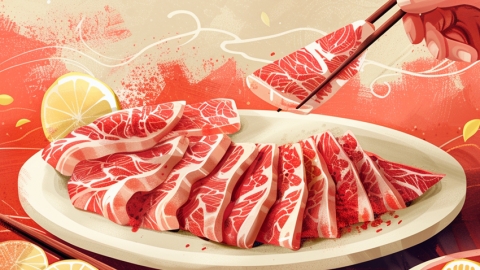What foods should not be eaten with lamb?
Generally speaking, lamb is nutritious but has a warm nature, and it is not recommended to consume it with foods such as watermelon, crab, mung beans, strong tea, or pumpkin. Detailed explanations are as follows:
1. Watermelon
Watermelon is a cold-natured fruit, while lamb is warm in nature. Eating them together may create a clash between cold and heat. Cold foods may neutralize the warming and nourishing effects of lamb and may also irritate the gastrointestinal tract, leading to gastrointestinal dysfunction and causing discomfort symptoms such as abdominal pain and diarrhea. Therefore, it is not recommended to eat them together.

2. Crab
Crab is cold in nature and is a high-protein food, while lamb also contains abundant protein. When consumed together, the cold-natured crab and warm-natured lamb may react in the body, potentially reducing the nutritional value of lamb and increasing the digestive burden on the gastrointestinal tract, easily causing bloating, diarrhea, and other issues. Therefore, it is best to avoid eating them together.
3. Mung Beans
Mung beans are cool in nature and have heat-clearing and detoxifying effects, while lamb is warming and nourishing. When consumed together, the cooling nature of mung beans may weaken the warming and nourishing effects of lamb, affecting the body's absorption of lamb's nutrients. Additionally, both contain significant amounts of dietary fiber, and excessive consumption together may increase the burden on the gastrointestinal tract, causing indigestion, especially for those with weak digestive function.
4. Strong Tea
Strong tea contains a high amount of tannic acid, while lamb is rich in protein. Tannic acid may combine with the protein in lamb to form precipitates that are difficult for the human body to digest and absorb. This not only reduces the nutritional value of lamb but may also slow gastrointestinal motility, leading to bloating, constipation, and other discomforts, affecting the body's absorption of nutrients. Therefore, it is not recommended to consume them together.
5. Pumpkin
Both pumpkin and lamb are warm-natured foods and have warming and nourishing effects. Consuming large amounts of both together may lead to excessive accumulation of warm-natured substances in the body, easily causing excessive internal heat. Symptoms such as dry mouth, sore throat, and constipation may occur. For individuals who are prone to excessive heat, the negative effects are more pronounced; therefore, they should not be consumed together.
In addition, lamb should also be avoided with cold-natured foods such as persimmons and pears. Moreover, when consuming lamb in daily life, individuals should intake it in appropriate amounts according to their own constitution. Hyperthyroidism patients, due to faster metabolism, should consume lamb cautiously; hypothyroidism patients may consume it in moderate amounts but should still pay attention to food pairing.




